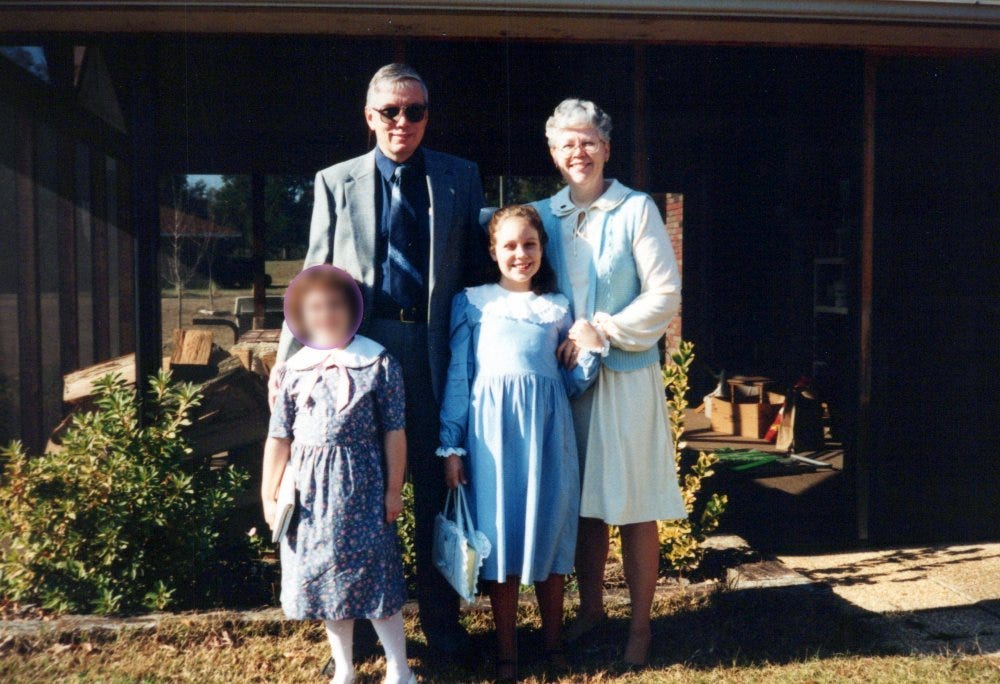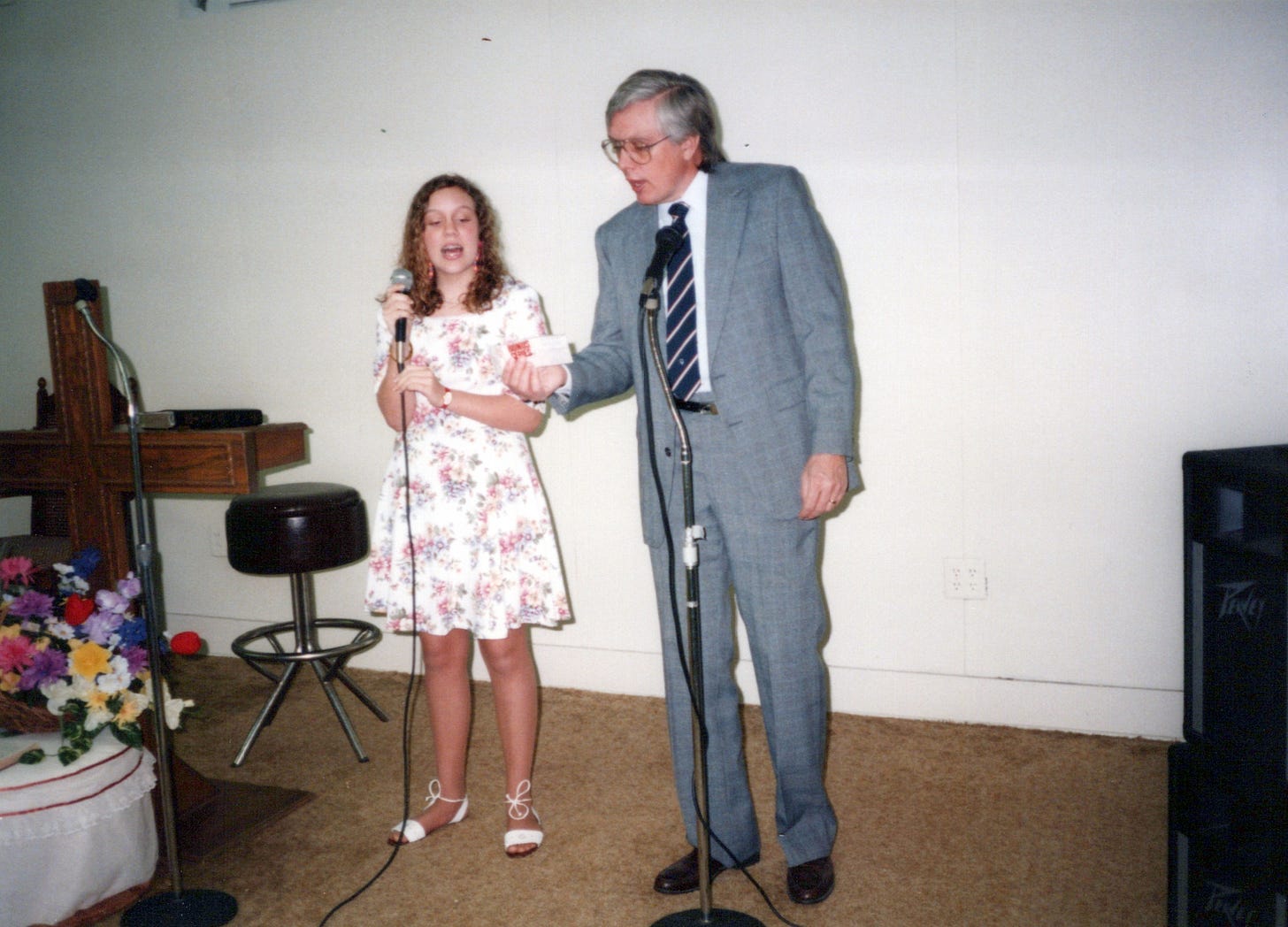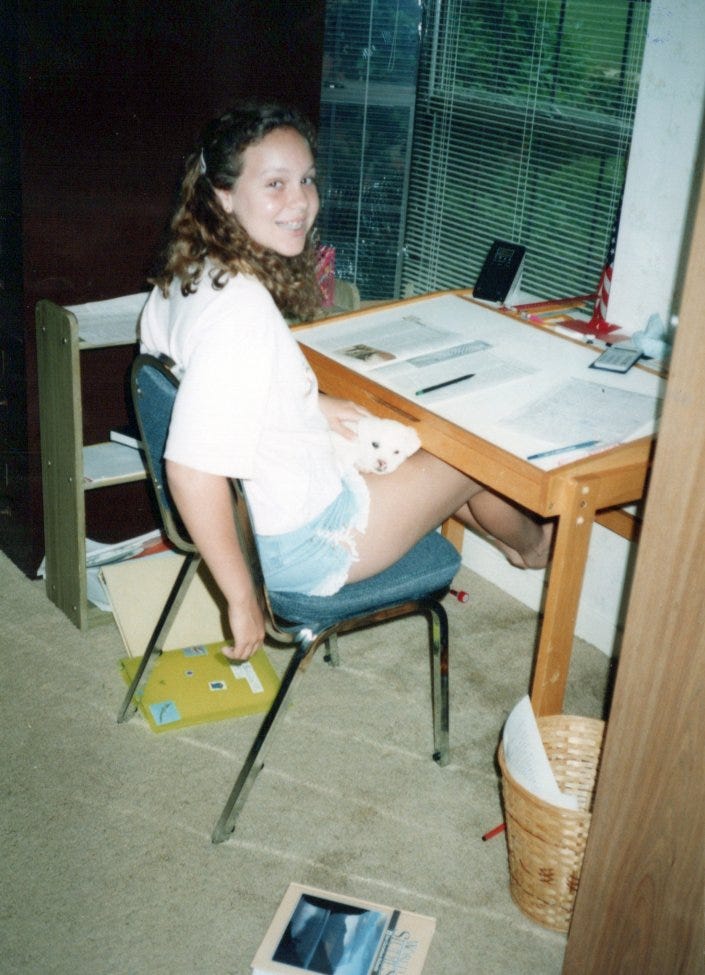Did I Narrowly Avoid Growing Up In A Cult?
Watching the Shiny Happy People documentary made me realize how easily that could have been my life.
In spite of seeming fairly normal until you talk to me for a few minutes, I was home schooled for the entirety of my childhood education. From 1987-1998 when I graduated a year early, I did my schoolwork in what was designed to be the formal living room of my childhood home.
The late 1980s were the beginning of the religious home schooling boom. Although my sister and I were not home schooled because of overtly religious reasons, my family attended an evangelical Southern Baptist church. We learned from Abeka, Lifepac, and Bob Jones University curriculum. You’ve probably heard of Bob Jones University because of its long history of racism, misogyny, and blaming people for being sexually assaulted. We had many friends who were also home schooled and many of their parents chose to do so in order to “protect them” from the secular world. One home schooling family that we were close to became a part of the Institute of Basic Life Principles (IBLP,) the evangelical cult that the documentary “Shiny Happy People” focuses on.
Even though it came out in 2023, I just got around to watching it. I was reminded of its existence because of the comment section on a video posted by influencers Matthew and Paul. Matthew is a fun loving classical violinist who has over 2 million followers on Instagram, mostly because of the good-natured pranks he pulls on his legally blind children’s book author husband, Paul. Recently, Matthew posted a video about escaping (literally climbing out the window) the evangelical cult that he grew up in. Commenters noted that the cult he was referencing was the IBLP. I told my spouse, “I had friends growing up whose parents got into the teachings of Bill Gothard.” As we watched the documentary, which is sadly full of the abuse that is pretty standard for these high-control religious groups, I wondered how my family had managed to evade that life.

As I went through old family photos looking for home schooling related ones, I noticed that for many years the friend that was my age from the IBLP family seemed to always be present - until she suddenly wasn’t anymore. Birthday sleepovers, casual hangouts, this friend was near me in almost all the photos up to a certain age. I can’t remember if they moved away, if we grew apart, or if I became considered a bad influence at some point so she wasn’t allowed to come over anymore. I dealt with my own trauma and undiagnosed neurodivergence by embracing being weird, something that was definitely not appreciated in any evangelical circles, then or now. I was never a bad kid, I didn’t even try alcohol until after high school. Sadly, being openly and unapologetically different was worse in a small southern town than actually engaging in unsafe behavior, the way half the “good kids” in my church youth group did.
Still, my childhood and teen years were dominated by church because there was no other choice. In Mississippi, church is the center of most social interactions. Also, children and teens have remarkably little control over their lives. If I didn’t go to church, I was grounded until the following Sunday, so most of the time I went to church. Whether it was the large, affluent church near our suburban subdivision that had recruited my parents or later the small, non-denominational church that was led by a charismatic former rock-n-roll guitar player who somehow did not evolve into a cult leader, church attendance was not optional.

All fundamentalist religions are high control, in my and other professional opinions. In belief structures where we are discouraged from asking questions and questioning those who have declared themselves to be in authority over us, there is always a risk of that power being abused. When you add the isolation of being schooled at home, where you have no daily contact with adults that are not family members who could observe abuse or neglect and intervene, the risk is even greater. Home schoolers have successfully lobbied to have very little government oversight, with the simple checks and balances that were in place to protect children at the beginning of my education gone by the end of it. If parents buy into cult-like ideologies and groups, there is simply no one there to protect their children.
After finishing “Shiny Happy People” I really thought about what was different about my family that were protective factors against what happened to my friend. This is what I identified:
Neither of my parents grew up in a high control religious group.
While both of my parents attended Christian denominational churches growing up, neither of them grew up in an evangelical or fundamentalist church. They were essentially recruited into an evangelical church by people coming to our home doing “visitation.” Being new to the area, they decided to try it out. This may have been the biggest reason that my parents were less likely to be interested in an even more controlling group like the IBLP.Education was highly valued in my family.
Each of my parents was the first person in their family to graduate college. While the education of many home schooled children was abysmal or even non-existent mine was not bad overall (in spite of being taught young earth theory.) That is not to say that education in general is a protective factor, in fact those that join cults tend to have higher education levels than average. This is specific, because I remember my mother taking issue with Bill Gothard’s financial teachings when presented with them. My friend’s family in the IBLP made some decisions based on Gothard’s teaching that all debt was wrong that I can recall my mother saying she thought were bad decisions.Reading was strongly encouraged.
There’s a reason that books are banned. Reading allows us to come into contact with new ideas, which then challenges us to question what we believe. Even though my formal education was lacking in many areas, including never reading some of the traditional high school reading list books, I read writers like Kafka, Nietzsche, Edgar Allan Poe, and Dylan Thomas at a young age. When I was older, I read feminists authors like Gloria Steinem, and queer authors like Felice Picano, Jeanette Winterson, and Sarah Schulman. Perhaps more importantly, I broke through the “only Christian and classical music’ rule that my mother imposed and eventually listened to feminist punk and riot grrrl bands like Babes in Toyland, 7 Year Bitch, Bikini Kill, and Hole but that’s a conversation for another day. Critical thought protects us from ideologies that ask us to obey based on little true authority. Having read the Bible herself multiple times, versus only listening to the teaching of those who claimed to be representatives of the Christian god, my mother was less likely to believe something that a charismatic leader said, simply because he said it.We were encouraged to think for ourselves.
Although it was certainly at odds with the religious ideology that children were to obey parents without question, my sister and I were taught and encouraged to think for ourselves. We were not encouraged to disagree or argue with our parents but it’s difficult to teach something like agency and then expect it to be conditional. My mother frequently disagreed with some of the things that the larger and more fundamentalist church we attended taught, such as women should not wear pants to church.
Certainly, I did not escape a religious upbringing without my own related trauma, simply being a queer person means that it caused an unfortunate amount of harm to me. I appreciate that the harm was less direct than the abuse that many of those in IBLP suffered at the hands of their parents, peers, and religious leaders.
I don’t know if any of that abuse touched the life of my friend. I decided to look her up on Facebook just to see if I could find her. Her most recent public post is heavily about religion, god, and being expected by her god to do things she doesn’t want to do in service to him. She also mentioned home schooling and explicitly that she enjoys teaching other women about her religion. Fundamentalist Christians don’t allow women to teach men because of one sentence in the new testament written by Paul, who never met Jesus. It’s a lot easier to take someone’s power when they give it to you freely because they think their mortal soul depends on it. So whether or not she was abused in overt ways, it’s easy to see that the brainwashing remains.
It may sound like I dislike Christianity but I actually think many of the teachings of Christ are positive and helpful ways to live. What I dislike is the systemic oppression of women and children, and the men who exploit that in order to uphold power, and the men that exploit that in order to abuse. I think that’s an important distinction because not everyone uses it to overtly abuse but anyone who thinks that their gender or sex makes them better than another because their god says so is abusive too, just not in a way that society acknowledges. The god that says that is also abusive. That ideology says Bill Gothard, a person who has been credibly accused of sexually harassing and assaulting over 30 women & girls, is more worthy of power; more deserving of leadership; more intelligent; and divinely equipped to simply be better than any of the people that he traumatized just because he was born a man.
That ideology is, no disrespect intended, fucking stupid.






